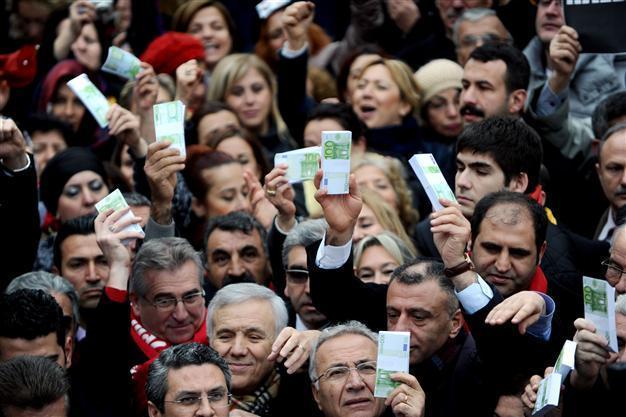Releases of graft suspects hurt public conscious: Turkish deputy PM
ANKARA

People hold stacks of fake money and shout slogans against the government during a demonstration. AFP Photo
The releases of the sons of two ex-ministers and prime suspect Reza Zarrab following serious corruption and graft claims have hurt the public conscience, Deputy Prime Minister Bülent Arınç has said, seeking to draw a line distinct from the prime minister.“[The releases pending trial] have hurt consciences, just like the cases of long imprisonment. I do not say, ‘Let them stay behind bars,’ but I want to see the [investigation] file include the extent to which a businessman influenced the public interest. Very different things could come up. I have witnessed a lot of things like this during my career as a lawyer,” Arınç told private broadcaster CNN Türk in a televised program late March 2.
Barış Güler, the son of former Interior Minister Muammer Güler; Barış Kaan Çağlayan, the son of former Economy Minister Zafer Çağlayan and Reza Zarrab, an Azeri-origin businessmen who allegedly bribed four ministers, were released pending trial on Feb. 27. With their releases, no suspects are left behind bars in the massive corruption and graft probe that started on Dec. 17.
“If the son of a minister is doing business with a man bribing [politicians], this is the most disgusting thing in the world. This is the same in every corner of the world. This takes places everywhere in the world, but is regarded as a cursed thing,” Arınç stressed.
The deputy prime minister also criticized the release of Süleyman Aslan the former director of a leading public bank, Halkbank, who was arrested after $4.5 million was found in shoe boxes in his house. “I do not even have a word to say about it,” Arınç said.
He recalled that prime suspect Zarrab had given a watch worth $700,000 to former Economy Minister Çağlayan as a present and a businessman had paid the tuition fees of the daughter of one of the prime minister’s advisors, and said he was “embarrassed” by the revelations. “If you ask me about the watch on his arm and his daughter’s fee, I cannot give an answer you because of my embarrassment. It’s not possible to cover up corruption,” he said.
Despite stating that the government was committed to fighting against corruption and investigating such claims, Arınç stressed that the real motivation of those who launched the graft probe was to topple the government.
“I am of this opinion today. I think this operation is not directly linked with Zarrab. They have been used in parallel to some developments abroad that are dedicated to tarnishing Turkey’s image,” he said.
According to Arınç, what began on Dec. 17 is not just an issue of “eavesdropping,” but a battle that has been ongoing for months. “It started with the [closure of] cram schools [dershanes]. The government has been criticized for this. Their tone rose to the point of hostility,” he said.
He added that the movement of Islamic scholar Fethullah Gülen had started to “threaten the government, which shows that our prime minister was right. The issue is not just about prep schools.”
Deputy Prime Minister Emrullah İşler followed Arınç and suggested that the Gülen movement had “blackmailed and threatened” the ruling Justice and Development Party (AKP) government.
“We knew from the beginning that the matter was not about the private cram schools. But some didn’t and looked at the matter as a prep school issue. As a matter of fact, the matter is a matter of rule, a matter of power,” İşler said, when asked about Arınç’s remarks.
















